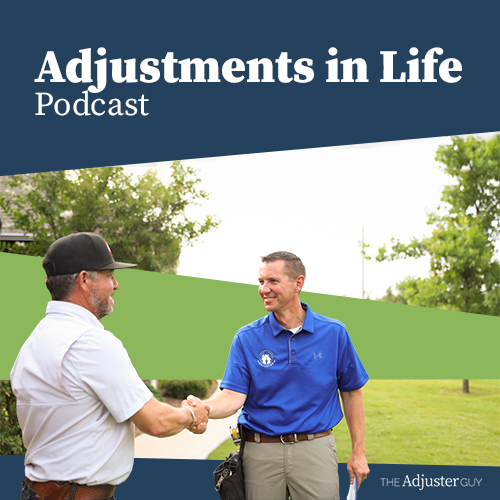Links
TAG Private Community: https://www.theadjusterguy.com/product-category/community/
Hipplock: https://hipplock.com/
Transcript
Alan Olson: Alright folks, it’s Friday again.
Welcome back, Jason Dyson. Hey, we have been compiling some emails here today wanted to take the opportunity to get those questions answered for all the folks that are sending into the email and if that’s not you, then send us an email of anything you want to know about.
Again, the emails that we’re answering are coming to podmail@usa.com. Anything you want to know that’s what we’ve said we’re here to do. We want to answer these questions and so let’s have a mailbag day.
Jason Dyson: I think it’s going to be fun.
Alan: I going to start with Jonathan from Cincinnati, Ohio and Jonathan brings up some good stuff here. Because I think every new gesture getting started or maybe even gestures that have been around for a while, it’s always a question of what certifications and what licenses do I carry? And how many of those do I carry?
So, what’s your thoughts on that?
Jason: I think if you’re a new adjuster starting out, you either brand new to the industry new to the industry, maybe you got a storm under your belt, but not fully developed with what firms you’re going to basically dance with the long haul?
Alan: Yeah.
Well, I agree with that. I think any license that you can have handy to you obviously, if you my first question to the adjuster is going to be do you live in a licensing state? Sure, and if you don’t know that, there’s plenty of places you can look that up.
You can just Google is Colorado, if you live in Colorado was Colorado, a licensing state for adjusters it’s going to pop up and tell you whether you need to carry a license in that state or not. There. If you don’t live in a licensing state, that’s fine to work in your state.
But if you want the opportunity to deploy anywhere else, you’re going to have to designate somewhere as a home state and go get that state’s license.
Jason: Sure, and I think, just from what I’ve seen, I think that probably two most popular ones, and probably because they reciprocate the best is probably going to be Texas and Indiana. From what I’ve seen.
Alan: I think Florida is still one of those, it’s in the running. But more and more states are opening up to carry a reciprocating home state license, that it’s okay for you to designate that state as your home state. If you live in a state that does not currently license for adjusters.
Now, not all new adjusters may not be able to or let’s put it this way, a lot of new adjusters may not be able to immediately go drop $2,000 on state licenses.
So, one of the things John Jonathan’s asking us is, do I need lots of state licenses? And if I do or don’t which states should I be buying if I’m on a limited budget?
Jason: Sure.
My answer to that would be obviously, get a license, you know, designate a home state get a license, Texas, Indiana, any of those are great, they’re both high involvement states if you will.
I think as a new adjuster starting off if you just wanted to get the minimal, the most effective ones I would say definitely Texas, Louisiana, Mississippi, Florida, all of the Gulf Coast, maybe the Carolinas. Your Hale states, Indiana was Scotson, Minnesota, Colorado, Dakotas, maybe you know my answer, I guess the big answer is you’ve got to understand you’ve got to make yourself marketable.
That’s right and when you are an unknown resource to a firm when they get to the point where okay, we’re now our core guys are out and now we’re looking for unknown resources and they start pulling from their portal, the information for guys that they’re willing to start calling and they’re going to say we have a need for adjusters in Indiana, so they’re literally going to pull okay, show me all my adjusters that are licensed in Indiana, and maybe they have some other requisites that they put on there as well.
But if you don’t have that license, you’re not even going to show up on that list and this changes a little bit that my answer for a known resource, a core adjuster, but definitely for the guy who’s starting off in it be as marketable as you can be, you don’t want to miss out on your first deployment, simply because you didn’t have a $50 state license.
Alan: That’s right. I agree and there’s a little bit of a misconception out there that if I don’t have all these licenses, I won’t even get the opportunity to deploy certain times of the year in certain storms, I believe that’s true.
In a mass call-out big hurricane situation, with the exception of certain states, there is going to be likely an opportunity for you pre-storm to go ahead and go purchase that state’s license. If you have a home state reciprocal license.
Jason: And if there’s that the major deployment event it’s probably going to be to the point where they’re going to be calling Emergency licensing absolute and you’ll be able to go that route as well.
But you don’t want to count on that and also, why not be the guy deployed before the guys that don’t have the license? That’s exactly right.
If you’re licensed to be an adjuster, and you’re waiting to get your first call out on deployment, we’re now in August, you should have your hurricane licenses if you have Texas, Louisiana, Mississippi, Florida, if you don’t carry anything, carry those.
Alan: Yep.
I mean, I would say this is just me personally, I would say you’re probably more likely to need the Gulf Coast states in Florida, maybe more so than the East Coast.
If you’re that adjuster that can only afford to buy, let’s say five licenses, then I would say get like you said Texas, Mississippi, Alabama, Louisiana, maybe even Florida and if you come into some money, or you get the opportunity to buy some of the East Coast states later in the year, do that.
But you’re always more likely to need those Gulf Coast more so than probably the Carolinas north.
Jason: Sure, and I think it can even be seasonal. You know, we’re into August, hail seasons, kind of starting to wind down a little bit.
If you’re looking to spend the money now definitely get the coastal states, we start getting back into hail season, probably we’re going to want to focus on some of those Midwest states and Colorado and some of those hail-known hail locations.
Alan: That’s right.
I will add this little snippet to it that we’re referring to mostly hurricane and hail-related states. Now, some of the newer adjusters that are needing to get their feet wet, and really looking for opportunity to get out and go to work you may not want to go there.
But if you’re willing to spend the money and get the West Coast states’ state licenses, if they’re offering them now 2020 was a strange year, some of those states chose not to offer new licenses.
But there is always opportunity to go to work on a more regional day claim or day rate or opportunity for deployments on the West Coast.
Jason: And let me add to that. I also think that the number one license, if you want to go to work may not be where you want to go.
But if you want to work and make yourself as deployable as possible. There’s always work in New York State.
Alan: Absolutely. I agree.
Those that have licenses in New York now are constantly bombarded with. We need you. It’s a tough place. I mean, you and I both have worked up there. It’s a tough place to make money.
You it takes a tough adjuster to work in those conditions every day. But the volume is there the volume is there and just like any other situation, get into as an adjuster. If you can get in there, get your feet on the ground and feel the feel it out and figure out how to make it the most efficient you can get it you’ll make money.
Sure, the opportunities there you’d anywhere you go, you just need claims. You can figure out how to move them around and make it bright, ample to make money. You just got to get there and get claims.
Jason: You know, it’s just you’ve got to figure it out the best logistical way to work that you know, from working Long Island to work in upstate and all that’s going to take is just getting out there and doing it and it’s probably not going to be a lot of fun.
But if you want to get out there and work firms are looking for New York.
Alan: And really anymore, California and Oregon Washington, they’re getting to be the same way. It’s logistically it’s a tough place to work.
They’re not prone states for hail or even really much wind for that matter. I mean, they do get a lot of wildfires. Most new adjusters probably aren’t going to get those opportunities. A few might.
But, primarily, my experience on the West Coast has been a lot of just everyday claims, toilet leaks, water leaks, vandalism, sure. But with that being said, there is ample opportunity all the time, if you’re willing to get those licenses to work in those states, and you can learn a lot about being a good adjuster in those states.
Jason: Absolutely and from working that day space for a person starting off, you get to see so many different causes of loss and different things that you know, maybe an adjuster who’s just starting off waiting for that first big hurricane is not going to get to experience and you’re going to be well more ahead of the packed with your experience in different losses.
Once you do that and I also think getting out there and being the guy to say, Yeah, I’ll take that assignment in California or New York or Washington State or wherever, when they are strapped and they can’t necessarily find somebody to work those areas.
Man, that’s a great foot in the door, you name is getting known to the manager, the deploying people, and you’re really setting yourself up for a good relationship long term with that firm.
Alan: Well, I’ll just put a little add a little story to this I keep the West Coast licenses, I don’t purchase California and the reason I don’t purchase California as an individual adjuster is because of the fact that most, most bigger firms have a firm license, and they can deploy you underneath that firms license to work in California.
So, if you want to get that license, it’s going to benefit you for sure. But under the right circumstances, the firm that is asking you to go is likely to be able to send you out there on their license.
But I keep Oregon in Washington, and there has been years that we didn’t get a lot of hail. The fall before was a real light fall for four hurricanes, there wasn’t a lot of activity that took place. So, when mid spring rolled around, and there wasn’t a lot of activity hitting in the Midwest with hail or even in the south, I started looking for opportunities to be able to get out and work and anytime I called in and said, hey, I’d like to go to Washington State.
It was how quickly can you be there?
Jason: Sure.
You know, to get back to the question at hand for an adjuster starting off, if you’re new or don’t necessarily have that relationship developed with the firm, be marketable.
You know, they’re looking for they don’t know you they don’t know your work product yet. All they know is who has what license? and like we’ve always said on this show, when they call you and say hey, we see you have California? When would you like me to be there?
And go, as you develop in your career, and you form those relationships with the firms that you’re going to dance with long term? I think that answer this question may change a little bit.
I operate a little different than Alan, I think Alan carries way more licenses than I do. I still keep my Gulf Coast states.
But for the most part, I have a Texas resident online license. So, it’s very easy for me to go grab whatever license, I need to absolutely do it in the truck on the way to the deployment.
But I’m at a stage where when I’m getting called for deployment, it’s not a random pool of unknown resources at that point.
Alan: I agree.
I think currently I’m holding about 14 different state licenses and I don’t necessarily my stance on this is I don’t necessarily need all of those.
But I made an investment early on to purchase them and it’s a lot less of an investment to keep them going for me and keep renewing them than it would be in a lot of circumstances to let them lapse and then have to pay the full fee to get them back.
Now, there are some states that I know if I get deployed to it’s not likely I’m going to go back there for a considerable amount of time.
So, those are the ones that I’m probably going to let go and not keep going right. But everybody approaches it in a different way and again, at likewise, I hold a Texas reciprocal license and so, like you said a minute ago, it’s really easy to jump online and get whatever license you want, at a moment’s notice.
But I think where you are going with that is in the stages, we’re in, in our career, we don’t we have built a rapport with, if not multiple, one or two bigger firms that we have probably worked for pretty steadily for a number of years now.
So, we are less likely to have to be looked at on a list when they need somebody in a specific area and when they call, they may say, do you have this license? That should be our answers. Yes, yes, we do.
Even if you don’t have it, because we can get it really quick. But even if, if they know we don’t have that license, they’ll say go, we’re going to deploy you go ahead and get that license now.
But in the early stages, they don’t know you yet. They don’t you don’t have that report. So, you need that to show up in the portal when they’re looking?
Jason: Absolutely and again, we keep preaching this up, keep your portals updated, because you absolutely get a new license, go into every one of your firms’ portals and update it because they don’t know if you don’t tell them.
Alan: That’s exactly right.
If any of you have looked into or if taken or plan to take the framework course, on TheAdjusterGuy.com. One of the things that we talked about on there as lifeline and we that’s what we call the portal, the portal is your lifeline.
Because if you don’t invest into that portal can’t give you any life. You can’t get anywhere in this business without that portal in the way they operate today.
Jason: Absolutely.
You know, I think the other half of the question is here, if we want to switch gears is maybe certifications.
Alan: Yeah, absolutely.
That’s another thing Jonathan wrote in his email, what certifications should he get and maybe which ones do we feel are most beneficial to him?
Now, Jonathan stated in his email that he’s a six-month adjuster. Okay. So, in my eyes, that’s, that’s pretty much brand new. Six months in, I didn’t mention if he had a chance to work any claims yet or not.
But I would say, if you know, it’s fall. So, we’re looking at how six months back, he got it licensed or got licensed this spring? I think you and I would both agree.
Right now, any certification that’s available to you need to get.
Jason: Absolutely any good education, and any, any client, any insurance company certifications you can get, I don’t need to go down the list of all the different insurance companies, but through the firms that you’re signed up with, if they offer free or low-cost certifications for whatever clients, you should have them all.
Again, it’s all about being marketable. That’s right if they have a deployment for Nationwide Insurance, and you don’t have that, that certification, guess what, you’re not going to get that phone call.
Typically, even if they do charge for those certifications, it’s not expensive. No, you know, should you get on an airplane and fly all over the country collecting certifications? Maybe not.
But watch the firm’s watch what they’re offering, watch what’s close to you, maybe you got to invest or take a gas to drive and get a hotel room for a night.
But I think it’s worth it that first deployment you get because you have that certification, one claim is going to pay for all of that.
Alan: Absolutely in it.
I mean, I’ll add to that, I don’t think that they, in the certifications that they’re offering. Now, it’s not a money-making scheme. They’re not making any money, if anything, they’re just trying to cover the cost of the paper test that they’re going to give you at the end of the certification, if there’s even a test.
So, many of them now are online, that as soon as you get signed up in your portal, or like I tell you is your lifeline, you get your lifeline set up, they’re going to start emailing you or they’re going to tell you Hey, get on here and here’s a whole list in here of certifications you can take we want you to take all of them we want you to be prepared for anything that we can offer you.
Jason: Any of the online trainings they have I mean a lot of them will have you know different maybe it’s not a true level one two or three exact domain certification but if they have exactly my training, sit through it if they have whatever damage identification, product identification, sit through it make yourself knowledgeable make yourself and let them know you did.
Did your roof damage analysis, training or whatever it may be? Make again I just keep coming back to make yourself marketable and all all of it is good information.
You know if we’re looking at you should you go out and travel across country and pay to be Hague certified? I don’t know about that.
Maybe if there’s one in your backyard and you get the opportunity to go to it great, but to pay to have the laminated Hague card? Yeah, I don’t know that it ever would have done me any good.
Alan: You know, I’ll put my two cents in on that. I think that any adjuster that’s willing to go take the time to become HEG, certified, good for you. There is nothing.
There is nothing no shame in investing in your education. Sure. Is it 100% necessary in adjusting today? I don’t think so and again, this is just my personal opinion.
I think a great company. But today’s standards of inspecting and documenting damage don’t necessarily apply to the rules of what hag qualifies as actual damage to a shingle.
Jason: I also believe that, from a managerial standpoint, if I’m looking at a resume, if you’re wanting to go spend your money on what the most bang for your buck, if I’m a manager looking at a resume, and I see Candidate A has Hague certification, but Candidate B doesn’t have Hague certification, but has his exact domain level two.
Yeah, to me that’s more valuable.
Alan: More applicable to what we’re doing in our job today to have an exact domain certification more so than a certification tool. So, yeah, I agree with that.
And in actually people ask all the time, should I spend the money? Because should I spend the money to get exact to make certified? That is a cost? Very few companies are going to give you that certification?
I say yes. That tool is if you’re working for a carrier.
Now, in in recent months, one of the largest carriers in the nation has switched to a different estimating platform, but you’re not going to get out of the woods with exact teammate by going and working them unless you’re only going to work them and I wouldn’t guarantee they’re going to stay on that platform forever. That’s just my own personal opinion.
Jason: You know, I think the exact made stuff especially for the new adjuster, do it, it’s going to teach you a lot. It you’re going to learn a lot.
It’s going to be good resume candy, you’re only as good, you know, you may be the best contractor in your state and know how to identify and write this estimate. But if you can’t take that information and put it into the computer in the format that the client wants it in. You don’t get paid.
Alan: That’s right. Yeah, I agree. 100%.
I think, in terms of carrier certifications, any of them you can get a hold of. There’s a little bit of a ideas that are being tossed around out there for specific carriers, some of the big carriers, do I need their certifications? Do I not neither? Well, maybe I don’t want to work state farm or maybe I don’t want to work Liberty Mutual?
Jason: My answer is do you want to work?
Alan: Yes. Right.
I won’t tell you who’s I’m not going to give you my opinion on who’s better or who’s worse or who who’s the right company to work for. You have to figure that out.
Not all insurance carriers’ values align with what every adjuster’s values align with. But I will say this, the big box carriers are who I’m going to call State Farm Liberty Mutual, maybe even nationwide, Allstate, they have an extreme abundance of work
Jason: And an understand they have the volume, you as a new adjuster are way more likely to get out on your first deployment with one of the big boys, then some of the smaller companies.
Also understand the big companies come with big support big managers, big, big infrastructure, if you will.
Starting off brand new, maybe it’s not a bad idea to go for one of the bigger companies and to get your feet wet and have that structure and support versus, okay, I want to work for this little boutique company, and that’s great and they may pay really great, but they’re going to say, Here’s your claims. Yeah. Well, what do I do with them?
Well, you go the portal and you download all the stuff and you set up your own exact domain and you read these guidelines, and oh, yeah, they all need to be turned and there is no support.
Alan: That’s right. You have a manager and he doesn’t have time to train you because he doesn’t have, he doesn’t want 30 trainers and 40 managers working the storm. Right? Exactly.
He didn’t even really want to be there with you. He doesn’t have time to mess with anybody. Right. But yeah, that’s a huge thing, especially for somebody new. You know, the bigger the carrier, the bigger outfit they’re going to have, they need them.
They’ve got to have they got to have the infrastructure in place because they have such a high volume of claims. Get through that without the infrastructure. They couldn’t be there.
Jason: And I’ll be one to say, you know, if you go out there and you learn how to how to handle claims for the big boys, the State Farm, the all-state the liberty, the whichever one of the big ones, they’re going to be more guideline and they’re way specific and I feel that if you can learn to handle claims under that environment where you’re actually doing, making policy, you have to read policy and make coverage calls and deal more with the customer.
Or the policyholder, I think if you can start off with that kind of client, it’s going to make you a much better adjuster in the long run.
Alan: Absolutely.
I think that, well, I’ll just tell you a little story. Some of the guys that have come through my courses, they go to work for mixed carriers. And they don’t even they don’t ever know always who they’re going to get an opportunity to go with.
You– we don’t always know who we’re going to get an opportunity to go with the demands are different for every type of storm, every region, the United States, but like you brought up those that have deployed with the bigger box carriers, they had an opportunity to be there at a slower pace, learning how to get started, because they had the support to be there to help them walk through those first few days of deployment.
And it made life easier for them and because that happened that way. Did they run out there and make top dollar on their first storm? No, they did.
Okay, they made it but they had somebody that could walk them through the difficult days and get them going and they were able to learn how to become really good adjusters over a period of time, where back in the day, most of us we just had to jump in and go in you had to learn like that.
Jason: And you either sink or swim and I think with the bigger firms and the support, they truly don’t want you to sink. They’re going to do everything they can to build you up and I think for a new adjuster, man get all the certifications you can get.
I mean, I have certifications for companies I’m never going to work for yet, but I have them.
Alan: I think I’ve probably got a minimum four or five that I’ve taken and in hopes that I would probably work in one day, but never have, haven’t needed to and for some of the newer guys, they may fall into a niche with one of these bigger companies, they got their teeth cut with them.
They’re comfortable with the way they do things. They’re making a good living being out there and again, some of these big companies, they have an abundance of work and if you’re good at what you do, you could work year-round and be literally have to beg for time off.
Jason: Absolutely.
So yeah, it’s definitely a be careful what you what you read on social media. I we’ve said it multiple times, there’s so many opinions and in so many people giving their two cents on the subjects out there and you got to understand what that person’s background is who’s giving you the answer?
Maybe Joe doesn’t like State Farm. Well, maybe Joe has been doing this for two years and doesn’t have to work for State Farm or maybe Joe only works the big hurricanes and only wants to work the Florida carriers, or maybe Joe doesn’t work at all, and Joseph has run his mouth that’s dry.
But you know, any work is when you’re starting off any work is good work. That’s right, get out there and get your feet wet and learn your craft and build from there.
Alan: Yep, I agree. 100%.
Well, we had a couple more mail to get to but it doesn’t look like we’re going to fit it into this episode. So, but we’re going to keep doing this. We’ll do a few more. Get some of these questions answered and again, let us know.
We love doing this. We love getting the information out to you. The email for the show is podmail@usa.com.
So. Alright, man. I guess it’s time to close it out and get out of here.
Jason: Yes, sir. Thanks again. Alan.
Alan: You bet man we’ll see this.





